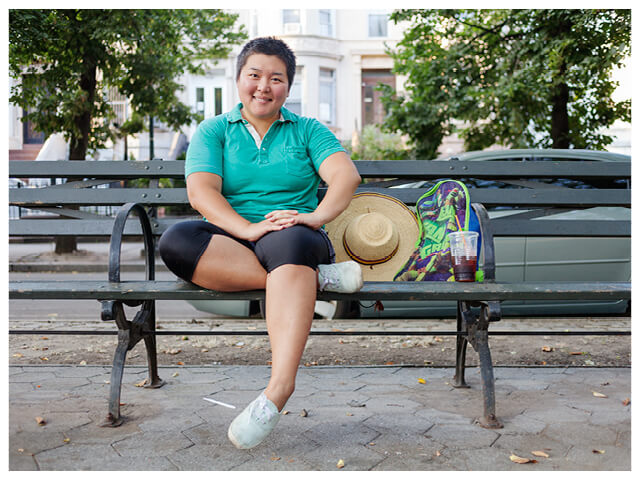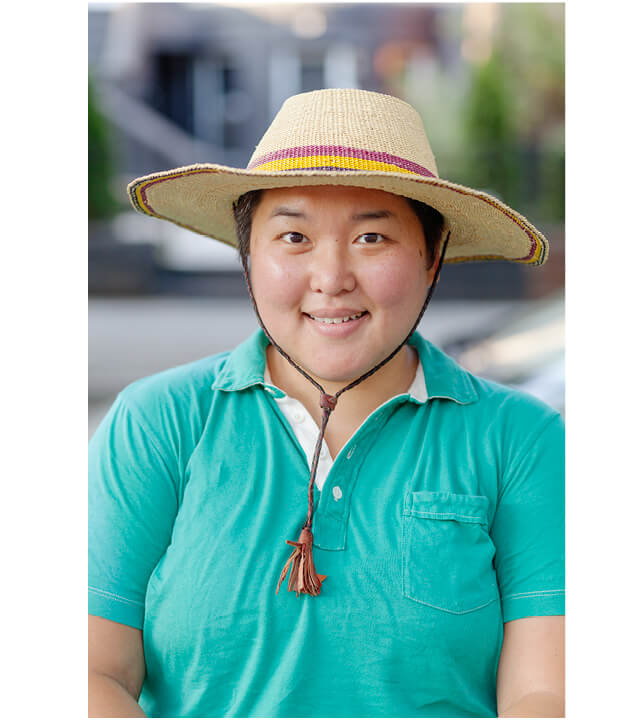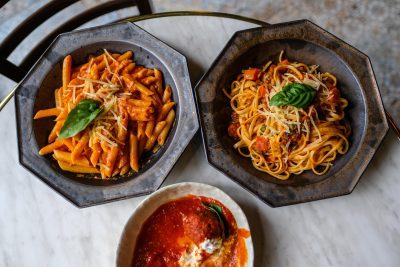People in Your Neighborhood: Hye Yun Park


Hye Yun Park on the Eastern Parkway benches by Nostrand Avenue
photos by Maggie Shannon
If there’s a better forum for subversive, narrative-driven comedy than the web series, we can’t think of it. Hye Yun Park’s series, Hey Yun!, is a perfect example of this boundary-pushing medium and has quickly become one of our favorite shows to binge-watch when we need the kind of dose of discomfort-inducing hilarity that comes in the form of an erotic clown act. (Yes, an erotic clown act.) So we were excited to get to chat with Park at Franklin Avenue coffee shop, Breukelen Coffee House about Hey Yun!, why it’s hard to be an indie filmmaker, and what her conservative Korean family thought about that erotic clown act.
I guess, first, a little background: How did you get here? “Here” meaning Brooklyn, but also, more importantly, meaning writing and acting in your own web series.
I was born and mostly raised in South Korea and after going to high school and college in Korea, I caught the acting bug and decided to come and try and make it in New York. So—after a lot of fighting with my family—I came here in 2007, and joined an acting conservatory. At the time I was going to be a very serious actress, and so I did what actors do—went out on auditions, doing projects here and there. But after two or three years, I just felt stuck and confused. So about five or six years ago, an acting mentor of mine who understood how many of his students were frustrated and having a hard time getting work, and were also confused about the compromises of so much of the industry, took a bunch of us to his friend’s place upstate and we all made our own short films, and also were a crew for each other’s. It became an answer to what would happen on a film set if the actors took charge of the whole creative process. I came out of it with this experimental, kooky, five- or six-minute thing and I thought, Oh, I really want to do this. So that was the beginning of that. I made a short film. And I made my web series. It was basically a frustrated actor makes material out of frustration. How I came to Brooklyn was, right before I came to Crown Heights, I lived in Astoria, but I had some roommate issues.


I feel like “Some Roommate Issues” is the name of a chapter of every New Yorker’s memoir.
Yeah! I was in such a hurry to get out that, for my next apartment, I hadn’t even met my new roommates when I moved in; I’d only met my landlord. In hindsight, that was a dangerous thing to do.
That could have ended poorly!
Yeah! But it was fine. This was four years ago. I didn’t even know Crown Heights, but I just fell in love with Eastern Parkway, and then I started exploring all the different areas. In the time I’ve been here, I’ve seen the slow and—recently—the quick progression on Franklin Avenue. It’s changed so quickly.
In the time you’ve been here, working as an actor in New York, lots of things have changed dramatically, notably the rise of the web series as a medium. What about this format is so appealing?
Yeah, I made my first season in 2013. And just between then and now, there’s a lot more out there. It’s like everybody either has a podcast or a web series in Brooklyn. After making my first short film, I realized that just getting it seen is difficult to do. Beginning filmmakers need to rely on the festival circuit, and there’s a learning curve about things like submission fees. And even if you get into the festival, you might need to make your own posters and do publicity. Just, cost-wise, I was a little flabbergasted, like, ok, it never ends. So that’s when I was like, ok, fuck it. I just want to put it up online. I want it to be seen. And I want to share it.
How has your family adjusted to your career? It must be something of a culture shock.
I graduated with a degree in communications from college, and what my parents wanted for me was to become an established interpreter or work for the UN. So, now, they’re on their own journey, constantly trying to have to destroy and rebuild their own expectations that they had for me. And I think until I make a feature film that becomes well-known, they won’t quite understand what I’m doing. They haven’t seen that many episodes of the web series, because unless I send them a link, they won’t seek it out. But recently I was visiting Korea, and I hadn’t visited in awhile and there was a big cultural clash. I just stick out like a sore thumb there, and there was a lot of fat-shaming coming from my family. There came a point where I was like, ok, this is hard to take. So I got a little mischievous. In one of the episodes in the second season, I do an erotic clown act. I made it in the thoughts of they’ll never see it. But with all the shaming about all the choices I’m making, I just decided to share it. And it was hilariously tragic. My mom had a panic attack, and my parents asked me why I still had to have this kind of teenage rebellion. And I explained to them that I might just have this rebellious side for the rest of my life. It’s my work. And in hindsight, I’m glad that I shared a truer side of me instead of hiding it away, but it was very hard on them. It would even be hard for pretty progressive American parents.
For more of Park’s work, visit here.
Follow Kristin Iversen on twitter @kmiversen
You might also like 




















